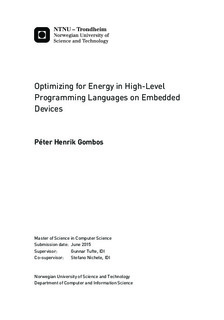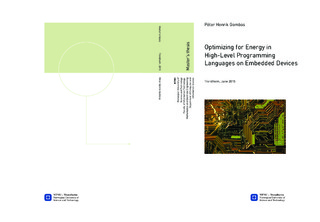| dc.description.abstract | The use of embedded systems has exploded recently, and thus also the number of developers for embedded systems. But the traditional way of programming embedded computers is hard and error prone, and the use of high-level programming languages is preferred. Unfortunately, with high-level languages come a high level of power usage.
This thesis examines techniques of bringing high-level programming languages, specifically JavaScript, to embedded computer systems, with a focus on driving down the energy use. Three different JavaScript engines, Tessel, Espruino, and io.js, are tested on the Tessel hardware and the Raspberry Pi. The tests consists of trivial operations run in a loop repeatedly.
io.js is shown to execute the programs the fastest of the three engines, and also uses the least amount of power per iteration. The Tessel is shown to have a sub-optimal implementation of some operations, which limits its performance. Espruino runs the benchmarks poorly, as they were not written with the execution model of Espruino in mind.
It is concluded that by increasing the execution speed of the software platforms, the system will be more power efficient. | |

